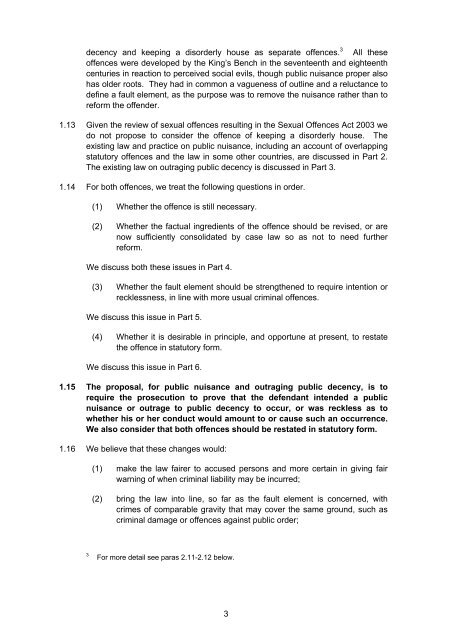public nuisance and outraging public decency - Law Commission
public nuisance and outraging public decency - Law Commission
public nuisance and outraging public decency - Law Commission
You also want an ePaper? Increase the reach of your titles
YUMPU automatically turns print PDFs into web optimized ePapers that Google loves.
<strong>decency</strong> <strong>and</strong> keeping a disorderly house as separate offences. 3 All these<br />
offences were developed by the King’s Bench in the seventeenth <strong>and</strong> eighteenth<br />
centuries in reaction to perceived social evils, though <strong>public</strong> <strong>nuisance</strong> proper also<br />
has older roots. They had in common a vagueness of outline <strong>and</strong> a reluctance to<br />
define a fault element, as the purpose was to remove the <strong>nuisance</strong> rather than to<br />
reform the offender.<br />
1.13 Given the review of sexual offences resulting in the Sexual Offences Act 2003 we<br />
do not propose to consider the offence of keeping a disorderly house. The<br />
existing law <strong>and</strong> practice on <strong>public</strong> <strong>nuisance</strong>, including an account of overlapping<br />
statutory offences <strong>and</strong> the law in some other countries, are discussed in Part 2.<br />
The existing law on <strong>outraging</strong> <strong>public</strong> <strong>decency</strong> is discussed in Part 3.<br />
1.14 For both offences, we treat the following questions in order.<br />
(1) Whether the offence is still necessary.<br />
(2) Whether the factual ingredients of the offence should be revised, or are<br />
now sufficiently consolidated by case law so as not to need further<br />
reform.<br />
We discuss both these issues in Part 4.<br />
(3) Whether the fault element should be strengthened to require intention or<br />
recklessness, in line with more usual criminal offences.<br />
We discuss this issue in Part 5.<br />
(4) Whether it is desirable in principle, <strong>and</strong> opportune at present, to restate<br />
the offence in statutory form.<br />
We discuss this issue in Part 6.<br />
1.15 The proposal, for <strong>public</strong> <strong>nuisance</strong> <strong>and</strong> <strong>outraging</strong> <strong>public</strong> <strong>decency</strong>, is to<br />
require the prosecution to prove that the defendant intended a <strong>public</strong><br />
<strong>nuisance</strong> or outrage to <strong>public</strong> <strong>decency</strong> to occur, or was reckless as to<br />
whether his or her conduct would amount to or cause such an occurrence.<br />
We also consider that both offences should be restated in statutory form.<br />
1.16 We believe that these changes would:<br />
(1) make the law fairer to accused persons <strong>and</strong> more certain in giving fair<br />
warning of when criminal liability may be incurred;<br />
(2) bring the law into line, so far as the fault element is concerned, with<br />
crimes of comparable gravity that may cover the same ground, such as<br />
criminal damage or offences against <strong>public</strong> order;<br />
3 For more detail see paras 2.11-2.12 below.<br />
3

















